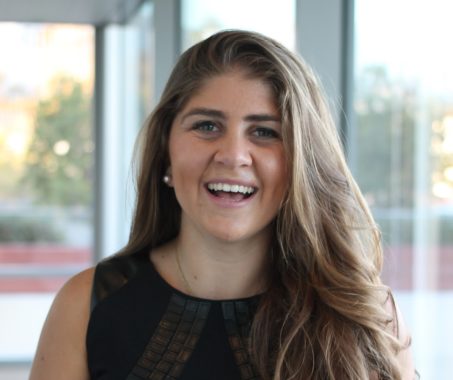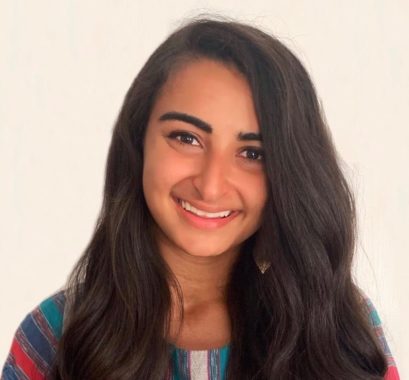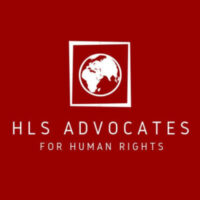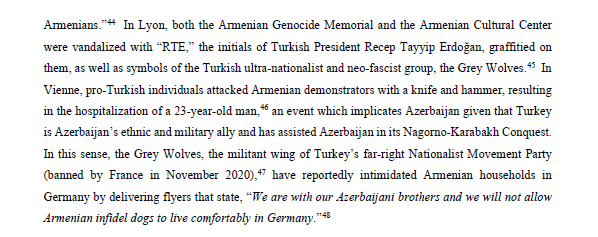
Please note that the views and opinions expressed in Spotlight essays are those of the authors and do not necessarily reflect the official policy or position of HLS Advocates for Human Rights.
Anoush Baghdassarian: Pursuing Accountability for Civilians in Nagorno-Karabakh
Interview by Sondra Anton (JD ‘22)
In response to the outbreak of war between Armenia and Azerbaijan late last year, Anoush Baghdassarian, a current student at Harvard Law School (JD ‘22) and Advocates’ Training and Community Development Coordinator, took action by assembling and leading a team of law students and lawyers to submit an alternative report to the United Nations Committee on the Elimination of Racial Discrimination (CERD). Submitted on December 18, 2020. The report alleges that Azerbaijan is in violation of its obligations under the International Convention on the Elimination of Racial Discrimination (ICERD) for its treatment of ethnic Armenians. Anoush filed the report through the Armenian Bar Association, a civil society organization based in the U.S. composed of American-Armenian lawyers.
Co-Director of Activism, Sondra Anton (JD ‘22), recently spoke with Anoush to learn more about this monumental effort.
Q: Anoush, you’ve been busy with several human rights initiatives since the war broke out in September, including this most recent report. Before we get into those, can you tell us a bit more about the conflict between Armenia and Azerbaijan and the significance of Nagorno-Karabakh?
Of course. First of all, thank you for taking the time to spotlight this conflict. It’s one that has not received much attention with all else that has been going on in the world and even just highlighting what’s happening and countering the disinformation is a huge help to the people on the ground. The report we’ll speak about centers on just that, countering Azerbaijani and Turkic disinformation and condemning the rampant hate speech and physical violence against Armenians around the world in the last few months, leaving many feeling threatened and frightened for their safety. The disparaging rhetoric coming from Azerbaijani and Turkic officials has incited violence to a level that often precedes genocides and ethnic cleansings, and if the international community doesn’t pay attention now, many fear worse consequences for the Armenian people in the near future. Before delving further into the report though, I should explain the basic background of the conflict.
Armenia and Azerbaijan are two countries in the Southern Caucasus and in between them lies a region internationally known as the Nagorno Karabakh Region (NKR), (though known to locals as “Artsakh”). Though the region is primarily comprised of ethnic Armenians, Azerbaijan claims the region is theirs as it was formerly a part of the Azerbaijani Soviet Socialist Republic during the time of the Soviet Union. At the collapse of the Soviet Union, when countries declared their independence, the people of NKR did the same, yet their independence was not recognized by Azerbaijan and so they became an ethnic Armenian enclave within the internationally recognized borders of Azerbaijan. A war broke out between 1992 and 1994 and, although it ended with the establishment of the Minsk Group to monitor the conflict and come to a peaceful resolution, they have fallen short of that goal and there have been skirmishes across the border of NKR and Azerbaijan on and off for the past 26 years. Beginning on September 27th, 2020, 44 days of fighting ensued until a trilateral statement was signed on November 10th, 2020 by heads of state of Russia, Azerbaijan, and Armenia to end the fighting.
While there is still much to be determined regarding the status of NKR and more, what must be addressed urgently are justice efforts. There are still reports that Armenian prisoners of war are being tortured (captured in footage), there are hundreds of thousands of displaced civilians, and anti-Armenian rhetoric and action continues to be incited by Azerbaijani officials, laying the grounds for nothing less than ethnic cleansing. Trying to bring some justice to victims of the conflict and to fight against impunity is how I hope to be able to contribute my knowledge most effectively.
Q: Watching this unfold, what inspired you to take action? How did your position as both a law student and a member of the Armenian community factor into this?
As so many of us in the Advocates community will understand, when you have a cause you are passionate about, it never seems like work when trying to move that cause forward. As law students specializing in human rights, we may find ourselves observing situations in the world in which we feel helpless. It’s intolerable. So, we try to find ways to help where we can and for me, that was through the mechanisms within the office of the UN High Commissioner for Human Rights. As soon as everything started happening in Armenia, a number of questions arose for me: How are we going to interview victims to preserve evidence? Who is going to preserve the remains of weapons fired from the other side? What treaties have been violated? Can we bring a case somewhere? Can we create a commission of inquiry or a fact finding mission? And so on. I think every Armenian was feeling something overwhelming like this and then used it to spur action, because the mobilization efforts throughout the Armenian community were beyond impressive… The unity and desire to find a way to help was palpable.
I often wonder if the sense of urgency to help stems from our desire as Armenians to prevent the past from being repeated. When the Armenian Genocide (1914-1923) was perpetrated, the term genocide didn’t yet exist. International tribunals to prosecute states, or state leaders, for crimes committed within their sovereign territory were unthinkable. It wasn’t until after the Holocaust that the world dynamic shifted and countries agreed to give up some of their sovereignty, allowing other countries to hold them accountable should they perpetrate such heinous acts against their own populations. Since then, the world of international criminal law has grown considerably. We want to make sure we use the tools available to us now, that weren’t available to us 100 years ago, to prevent perpetrating states from neglecting their responsibilities and to be held accountable for their abhorrent actions. According to Turkey, there is not enough evidence to prove that the Ottomans carried out a systematic plan of annihilation against the Armenian population to constitute genocide. Learning from this history, Armenians have a heightened sense of urgency to preserve the evidence from this conflict so a lack of evidence does not become grounds for impunity for Azerbaijan today.
Q: So in order to achieve that aim of international attention and accountability, you have started some incredible initiatives, most recently this report. Can you tell us more about the report?
Thank you Sondra. The report was prepared in advance of Azerbaijan’s upcoming review at the Committee on the Elimination of Racial Discrimination (CERD) which should take place in 2021. It focuses on Azerbaijan’s policies of racial discrimination against ethnic Armenians. Despite several international human rights bodies, including the CERD, having confirmed Azerbaijan’s policies as “concerning” on numerous occasions, Azerbaijan not only has failed to end these policies and practices but rather has exacerbated them during its recent military action against the predominantly Armenian-populated Republic of Artsakh and the Republic of Armenia.
The report details facts regarding the policies of racial hatred and discrimination against ethnic Armenians, facts which demonstrate that Azerbaijan has not eliminated the problems highlighted in the CERD’s Concluding Observations of 2016 and has not implemented the CERD’s recommendations, but has instead reinforced policies of racial hatred and discrimination against ethnic Armenians. Such policies resulted in the most profound and severe expressions of Armenophobia and anti-Armenian sentiment in Azerbaijan, which manifested also as physical harm to ethnic Armenians.
In highlighting the obligations Azerbaijan has failed to implement since its last review, along with the inflammatory speech against Armenians by Azerbaijani public figures and the violence against Armenians in Artsakh and around the world, this report urges the CERD to condemn Azerbaijan’s actions and take steps to prevent this from going any further as, too often, this type of rhetoric has been the precursor to ethnic cleansing and genocide.
Q: Can you tell us more about what this undertaking entailed and the process behind it?
The initiative came about really because there were many questions that needed answers and many international legal opportunities that weren’t being tapped into. I saw a gap I felt I could help fill in the international legal sphere and began to use whatever skills, knowledge, and networks I had to try to best fill those gaps. I spoke with lawyers within the Armenian Bar Association who focus on international law and with professors at the International Human Rights Clinic (IHRC) at HLS, and each conversation was foundational for these initiatives. Professors and other attorneys have helped me understand what I can be doing as a student, how to undertake those efforts, and who I can reach out to within our networks to ensure the process moves forward swiftly.
After a month of brainstorming with experts and lending my energy to other efforts, it seemed the first initiative I should begin myself was to create a document outlining the different human rights treaties that had been violated in the conflict. That would help us answer whether there could be involvement from the UN human rights treaty bodies and special procedures, whether there were grounds for a case, what evidence we should be focusing on collecting, how we could try to implement a fact finding mission, etc. While working on this, it soon became clear that this complex initiative required a team. I was lucky to find bright Armenian legal minds who were immediately passionate about the initiative and understood the sense of urgency to get this done well and fast. The team included my colleagues from around the world—Mariam, a former colleague in the Human Rights Defender’s office of Armenia, Maral and Gariné, two Argentinian peers and close friends studying public international law in Argentina, and Astghik, a recent UCLA law school graduate passionate about international criminal law. We outlined in depth how thirteen different treaties were violated throughout the conflict but paused our research there since we learned that the CERD’s review of Azerbaijan was only a few days away. We immediately mobilized to compile a report to send to the CERD. The next day we learned the review had been postponed, but we still kept working with urgency, and recruited more people to the team. Each initiative that I’ve been a part of, and particularly this report submission process, was carried by an incredible team effort and I couldn’t be more appreciative of everyone’s collaboration and determination to get this done.
That’s something I’ve been so impressed with throughout the past few months—how quickly and eagerly Armenians have come together to collaborate on efforts for Armenia. The unity and generosity of time, knowledge, and expertise is inspiring.. I’m particularly grateful to the Armenian Bar Association for helping to bring people together and for placing their trust in me by welcoming this initiative and allowing me the liberty to lead it. They were also generous in offering our team of students and recent graduates help from lawyers on their more formal task forces. The final product was an almost 40-page report with an annex of over 50 pages–all written in three weeks—and was submitted to the United Nations Committee on the Elimination of Racial Discrimination on December 18th and released publicly on December 22. It was a true team effort and I am both proud of it and humbled by the process that made it possible.
Q: How did you manage that in such a short time frame and what was that process like of managing a team?
I have been lucky to work with such a responsible and professional team who demonstrated from day one their dedication and selflessness to the initiative. The whole team contributed with questions, ideas, and solutions throughout the process that really made a difference and I’m very thankful for everyone on our international team. The team includes Mariam Ghazaryan in Armenia, Gariné and Maral Morcecian in Argentina, and Astghik Hairapetian, Ovsanna Takvoryan, Mariam Nazaretyan, Mary Manukyan, Haig Ter-Ghevondian, and Kristine Kousherian in California, and Yelena Ambartsumian, and myself, based in New York. Everyone’s dedication helped make this a reality.
As to your question about managing a team, I have some experience “managing” as we have a staff of about 10 people for Rerooted, (an archive I co-founded documenting the testimonies of Syrian-Armenian refugees) and that experience was helpful for this initiative. In addition to researching and drafting my own sections of the report, my role was in bringing people together, assigning them tasks, setting deadlines, and reviewing everyone’s work. Although each of us had our own responsibilities in addition to this initiative, nothing seemed as important as trying to do what little we could to help make the situation better for people on the ground in even the smallest way. So, despite taking care of kids, other clients, or in my case dealing with an overloaded course load, the urgency of this was never lost on us. It all pales in comparison to people losing their lives in the region, so this really felt like the least we could do.
Q: Now that you are done with the process, do you have any reflections on how it went and what are your next steps?
You know, in the last few weeks, many people have asked me whether this is going to create any immediate relief for the people on the ground. That’s a really important question and I often answer that this is a “softer” avenue for justice and that it’s a start. It’s an important step for us to be able to say we didn’t leave an avenue for justice unexplored. It won’t bring lost lives back and it won’t provide homes for those displaced, we realize that. Thankfully there are many other Armenian initiatives working toward helping those on the ground more directly and UN advocacy like this is something that we as law students and recent graduates can do ourselves to help fill a gap.
As for next steps, our team accomplished all we had on our list to achieve “by the holidays,” but there is still so much more to be done…unfortunately, this is only the beginning. The next initiatives on my list still involve the UN and I am eager to begin working on those now. Beyond myself, almost every member of this team is also working on at least one other Armenian initiative—a few of us are working on testimony collection, a few of us are writing articles about the conflict, and others are working on Spanish advocacy and drafting new UN reports.
There hasn’t been much happiness regarding the situation in Armenia over the past few months, but this is a little sliver of hopefulness that has existed at least for me—working with others to use whatever tools we have in the search for justice. Hopefully soon we will see the situation on the ground improving too.
Q: Do you have any advice for other people wanting to take action for causes that matter to them?
If you have a strong conviction for a cause, find ways to achieve the goals you set. Learn what the community needs, start floating your ideas around with those in your circles, do research, ask questions, learn more about what it would take to achieve such a goal, find out if other people are already working on that, build a team, etc. These are small consecutive steps you can take that can develop into something greater to help your cause. Don’t be afraid to reach out or ask questions. What’s the worst that can happen? Someone may say no, but from there you simply find another avenue to achieve your goal. In my opinion, it’s always worth a shot to think big and try to achieve the things you care about, because if you don’t even ask, you’ll never know if it was possible.
Q: I couldn’t agree more, Anoush! Thanks so much for taking the time to share your experience and reflection, and we look forward to hearing more about your incredible work in the future!
Thank you so much for this opportunity to highlight what’s happening in the Armenian community, and these efforts in particular. Your interest and care really mean a lot. If anyone reading this wants to help out with any of these efforts, please don’t hesitate to reach out to me! We’d love extra legal support from anyone with the passion and interest to help.

ANOUSH BAGHDASSARIAN (JD ‘22)
Anoush Baghdassarian is a J.D. Candidate at Harvard Law School. She hasa Master’s in Human Rights Studies from Columbia University, and a Bachelor’s in Psychology and Genocide Studies from Claremont McKenna College. She is co-founder of the Rerooted Archive, documenting over 200 testimonies from Syrian-Armenian refugees who have fled Syria in the last ten years. She has a career focus on transitional justice and international criminal law, and some of her work experiences include interning as an advisor to the Armenian Permanent Mission to the U.N. and serving as an upcoming visiting professional at the International Criminal Court.

SONDRA ANTON (JD ‘22)
Sondra Anton is a J.D. Candidate at Harvard Law School. She received her master’s degree in politics from the University of Oxford, and a B.A. Honors from Washington University in St. Louis as a Danforth Scholar. Sondra’s research and professional experience fall primarily within the field of international human rights law, particularly topics surrounding justice and accountability in post-conflict societies. Following law school, she hopes to use her law degree to represent victims and survivors of mass atrocity and severe human rights abuses in national courts or international tribunals.






